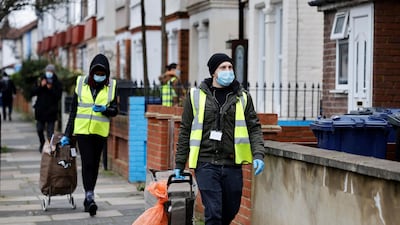There are about 4,000 variants of coronavirus around the world, UK Vaccine Deployment Minister Nadhim Zahawi said on Thursday.
Mr Zahawi said the UK was keeping a genetic library of the variants so that vaccines could be adapted if they proved ineffective against a particular strain.
The UK this week strengthened a stay-home order in parts of England where cases of the South African Covid-19 strain were confirmed among people who have not recently been overseas.
Ministers vowed to suppress the variant, bringing in surge testing for 80,000 people, while the vaccination programme continues.
New strains, including the so-called British and Brazilian variants, appear to spread more swiftly than others.
Mr Zahawi said it was unlikely that the current vaccines would not work against the variants.
However, the UK needs to be prepared, he said.
“It's very unlikely that the current vaccine won’t be effective on the variants whether in Kent or other variants, especially when it comes to severe illness and hospitalisation,” he told Sky News.
“All manufacturers, Pfizer/BioNTech, Moderna, Oxford/AstraZeneca and others, are looking at how they can improve their vaccine to make sure that we are ready for any variant – there are about 4,000 variants around the world of Covid now.”
To date, the UK has given 10,021,471 people a first dose of a vaccine, with 498,962 receiving a second dose, according to the latest government data.
Mr Zahawi said vaccine uptake remained "incredibly high" but admitted that 15 per cent of eligible adults were still refusing to be inoculated, chiefly from minority backgrounds.
He said that he feared Covid-19 would spread "like wildfire" through unvaccinated groups if they remained unprotected.
“Vaccine acceptance in the UK is the highest in the world and I’m very proud of that. The ONS (Office for National Statistics) survey suggests 85 per cent of adults will take a vaccine,” he said.
“That’s great on its own but the 15 per cent skew heavily toward BAME communities, and especially the black and Afro-Caribbean community, which I am concerned about.”
Why has the UK brought in surge testing?
Public Health England identified 11 cases of the South African strain over the past week in people who had no known links to overseas travel.
Earlier, the UK had 105 cases of the variant, but all of those cases were people who had recently been to South Africa, or had close contact with people who had.
The 11 unexplained cases have raised fears that the South African strain may be in community transmission in the UK.
Health Secretary Matt Hancock said the UK would "need to come down on it hard" before the strain spread out of control, undoing the the recent reduction in daily cases.
Do vaccines work against the South African variant?
Scientists are concerned that the current vaccines may be less effective against the South African variant than the original strain.
Novavax and Johnson & Johnson's vaccine was 85 per cent effective against the UK strain, but that dropped below 60 per cent in the South African trials.
Prof Calum Semple of the University of Liverpool said the UK needed to guard the vaccines from the South African variant.
“It's incredibly important to snuff it out when you can and seek it out when you can, and use that time of suppression to maximise vaccination,” Prof Semple said.











